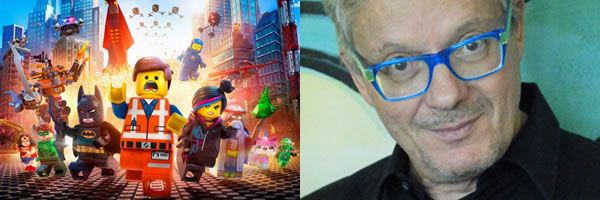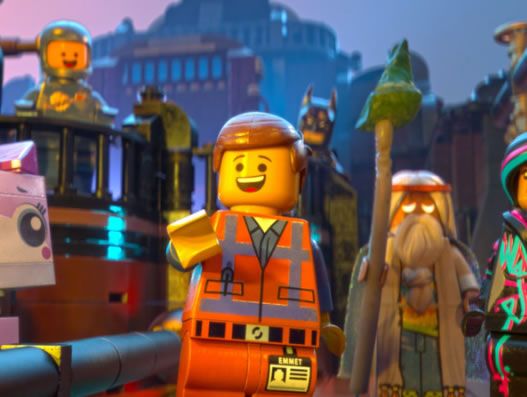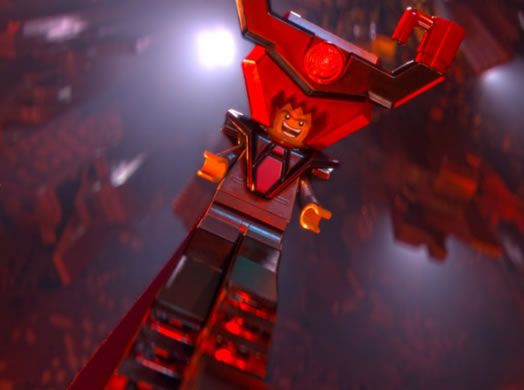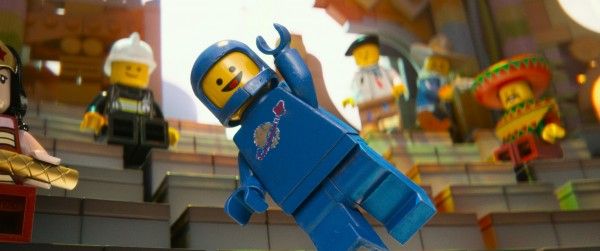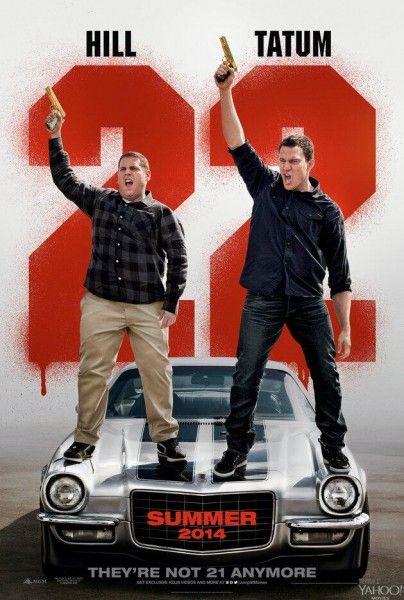Musician Mark Mothersbaugh has had a diverse, wonderful career that has spanned from the new wave band Devo to writing music for films, television series, and video games. His latest score is for the hit film, The LEGO Movie. For those who still haven't seen The LEGO Movie, Mothersbaugh score is peppy, joyous, and goes perfectly with the upbeat, fun-loving tone of the picture.
Last week, I got a chance to interview Mothersbaugh over the phone. During our conversation, we talked about re-teaming with directors Phil Lord and Chris Miller, the style of the picture before they took over, writing music for video games and TV as compared to movies, working on Lord and Miller's next movie, 22 Jump Street, and more. Hit the jump to check out the interview.
How are you doing today, sir?
MARK MOTHERSBOUGH: I'm good. How are you?
I'm good. Teenage me is very excited to be talking to the composer of the Crash Bandicoot games. You've done amazing work, if I went back in time and told myself that I would not believe it. So thank you for joining me today. With The Lego Movie, how early did you become involved in the process and what were your initial thoughts when you signed on?
MOTHERSBOUGH: This is the fourth movie that I've done with this set of director-writers and I've learned to trust them at this point, because actually I started on Lego before they did. About five years ago the producer asked me to help him with a presentation for a totally different version of what the movie would look like, I looked at it and I said, "I can give you some ideas," and that was about it. Then I said, "You should meet these guys I'm working with now on Cloudy with a Chance of Meatballs." I was just on the first Cloudy at the time, so they owe this gig to me. It was a totally different movie before they got involved, this was the fourth movie I'd done with them, they'd taken a slim book called Cloudy with a Chance of Meatballs on the first one and turned it into a pretty good movie.
I adore Cloudy with a Chance of Meatballs. I adore it.
MOTHERSBOUGH: Yeah, [laughs] and then they took 21 Jump Street and they said, "Hey we're going to do a movie called 21 Jump Street. Will you do it with us?" And I was like, "Let me see what it looks like", and I went online and looked at 21 Jump Street on YouTube and I was like, "This has got to be the lamest TV show ever made. What in the heck do they want to make a film out of it for?" Then they did this great film. So by the time we got to Lego and I knew they were coming on board- I had seen earlier, before them, I had seen ideas for the Lego film that had been tossed around and theirs was much more satisfying and bigger.
Again, I love those guys. I also love 21 Jump Street, and they brought a very irreverent, but also very creative, heartfelt tone. You mentioned it was a very different film before they signed on, what was that movie going for?
MOTHERSBOUGH: God, I don't even know if I'm allowed to tell, because I signed non-disclosures for it.
Ah, okay, I don't want to get you in trouble.
MOTHERSBOUGH: It was more like a typical comedic- and it took place in the real world, the animation was just kind of an add on.
I see, so it was kind of a live-action/CG blend?
MOTHERSBOUGH: Yeah, so it wasn't any of the visual aspects. As a matter of fact it took place in a bachelor's crummy apartment. So it was a totally different story.
So know that you've worked with Phil and Chris over three films is there just kind of a trust there? Is there something now where you guys have sort of an unspoken dialogue between you? What is that relationship like?
MOTHERSBOUGH: Yeah, that's the benefit. Lego was our fourth film, because we did two Cloudys, so yeah there's a little bit of shorthand that’s involved and then you can anticipate things- because for me it's like, I get a script for a movie and I go, "Wow that's a pretty good script", then you sign on and a couple months later they show you the first cut and you're like, "Whoa, how did that happen?" It's just kind of the nature of films, there are so may things that can drive it off the road. But with these guys we got to the point where I kind of understand what they mean by their terminology and it allows you to get places faster. So when we were first talking about it they showed me early rough tests for what the animation was going to look like and it was just kind of amazing the ideas, like gigantic ocean waves hitting a pirate scooter made out of Lego, everything was made out of Lego, the water was made out of Lego bricks, the surf, the foam on top of the waves, was made out of Lego bricks, so there were millions of Lego bricks in each scene. I was excited, I wanted to find a sound that would match that so I knew it was going to be a hybrid orchestral, but leaning heavily on electronics kind of score.
Part of the film's appeal is that it takes place in different settings, so how do you give each place it's own feel but keep the score cohesive?
MOTHERSBOUGH: There's different things you do. First off, it's the same orchestra that's recording on every cue so it doesn't sound all that spliced together just because its all the same people. It's the same 32 violins playing, the same 8 bases, the same set of brass and woodwind playing on every cue so they bring something that has a consistency to it. But then to differentiate it- for instance in the wild west scene I used the whistler that whistled in Ennio Morricone's movies, the old Italian guy, we found him and put his whistle in the movie so that would bring a kind of spaghetti western feel to it.
"Everything is Awesome" is getting a lot of attention because it's catchy, but another great song is "Untitled Self Portrait", what was the process of writing that one with Will Arnett, and- weren't there two other people that wrote it?
MOTHERSBOUGH: Well Phil and Chris worked on lyrics for everything, they worked on everything, and then it starts from their concept- it wasn’t like the movie was built around the songs, it's like the songs were built because of the movie. The process is just kind of back and forth, Will Arnett and I were never in the same room, but once I saw early animation we started writing music for that and then he just kind of did his little rap over top, some of it was free form and some of it I made up, we all just kind of contributed to it.
One of the other things I wanted to touch on was the diversity of your work, and of course I started off talking about Crash Bandicoot of all things, but I was curious how the process of creating a score for a TV series or a videogame differs from developing a score for a film?
MOTHERSBOUGH: Well they're totally different animals. TV series, there's a lot of everybody talking to you and giving you input for the first couple episodes, and then they're on such a crazy schedule that you get another episode on a Monday, you have to have it done by Friday and it becomes very solitary work usually, TV shows. What makes games so exciting is that’s a whole other- there's all sorts of other considerations on what music is supposed to achieve and what you're attempting to support, it's not uncommon to think of your music and to think of the way your orchestra plays for something like Jack and Daxter where you start with- you know because it has to change tempo and intensity as the action gets more intense. So maybe Homer Simpson's running around a food court and he grabs a couple burgers, and you just have the basses playing whatever the total piece of music is, and they're maybe playing a legato passage, so they're going slow, like half speed, and then as he picks up more- whoever is running the game, you might be on that level the first time for like three or four minutes before you go to the next level and then you might be there for five minutes and have to start over, but as you get to know it you want to be able to move at a faster pace through the different stages of the game. So your music has to be plastic in the sense that you have your themes and your style of music, but if somebody does something at 42 second, or if they do it at 43 seconds, or if they do it at a minute and a half the music can instantly change, and not just the legato-y stuff that's playing half speed, then you have things that are playing on quarter notes now and maybe strings or something are coming in, and then maybe as the action gets more intense, then you bring in percussion or something and then you have a whole other layer you add, you maybe have four different layers to the same piece of music that can keep adding on as you get closer to your goal for that level. So it's kind of an abstract way to think of music, but it makes it fun. To me its kind of like the opposite- or it's just another version of playing a piano with seven keys that have been broken so you have to write the music to accommodate that. And if you have a goal or something unofficial, our music might play for five minutes or it might play for twenty seconds depending on how good the game player is. It's kind of fun. It makes you think about how do you write a piece of music that you can endure it for five to ten minutes the first time you play it and that will still work and you still know what you're listening to when it's only 30 seconds at a shot? Games are great.
I like that you mentioned sort of trying to come up with music- because as somebody who plays video games, when you get stuck that music is going to keep cycling and you definitely want to have something that doesn’t grate on the nerves.
MOTHERSBOUGH: Yeah, you want something that is spiraling upwards. If things are going the way that they should in a game, if things are moving positively, you want them to spiral upwards so that by the time you get to the last part of it in the game, if you're at the end of an alley, or you’ve scored enough points, or whatever it is that you're doing in the game, you want it to be a flexible enough piece of music that it sounds great if you finish the whole thing in two minutes or twenty minutes.
It's kind of Pavlovian. On of the things I like about Peggle is that if you beat a level it plays Ode to Joy, which is the most triumphant thing you can get for beating a silly game about knocking out pegs.
MOTHERSBOUGH: [Laughs] That's one of the things-for different things you get to do that, and even with TV, when I'm writing a theme song for a TV show I always think, "What would be Pavlovian where a kid would be in the kitchen, or an adult would be in the kitchen, and they hear the theme song come on and it would draw them back to the other room so that they would watch the show?"
So when they make The Lego Movie the video game do you get consulted on that when they're working on the score?
MOTHERSBOUGH: Well, crazy, on the videogame that’s coming out with the movie I scored it at the same time, so a lot of the music will be similar but it will be without the final orchestra. Some of the music is more like what my mockups were, because of the time restraints they were under and when they wanted to release it, it was impossible for the game people to wait until I recorded for the movie. So they used a lot of the temp music for the film, and some of it is kind of funny because it's themes that I originally wrote for the movie and then as we got closer to recording time I changed some of those themes. But for the most part it relates pretty well to the actual movie.
Circling back, like you said this is the fourth film that you've worked on with Phil and Chris and you're also scoring 22 Jump Street—
MOTHERSBOUGH: Starts tomorrow for me.
What I love about the score for the first movie is that it's very much like an action movie parody in a way and I was curious how you're building on those themes for 22 Jump Street.
MOTHERSBOUGH: Well I haven't even seen the whole film yet, I've only seen some clips, so I've been writing some things. As a matter of fact, in between interviews today I'm writing a breakup theme for the two main characters, because they split apart for a good portion of the film. But it's kind of easier when you do a sequel because I can go back to the themes that people know, or themes that we’ve already worked into the film so they'll come back again in the reprieve. So yeah, sequels are cool.

